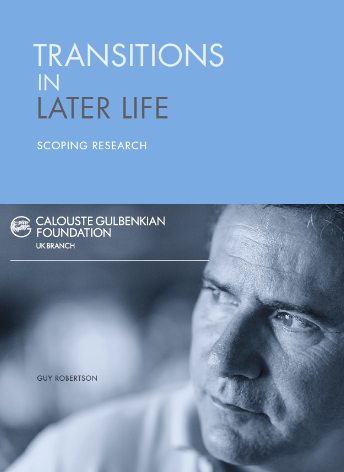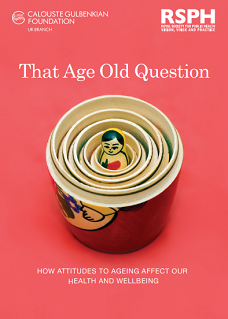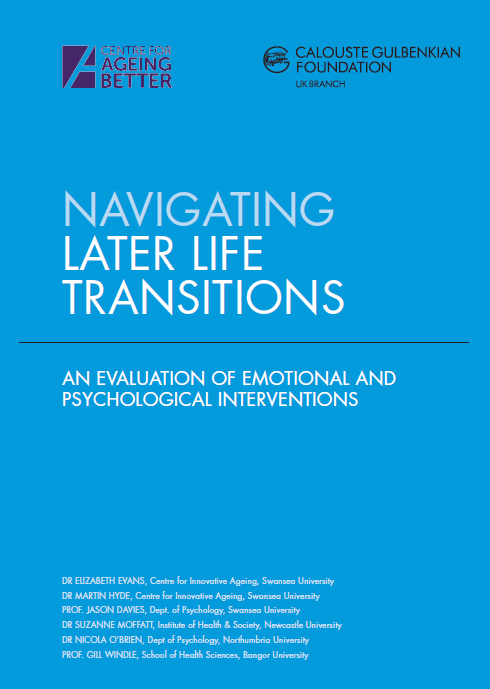Transitions in Later Life: Research and Evaluation
Transitions in Later Life (2014-19) was the first funding programme of its kind in the UK to concentrate on improving how people are supported ahead of retirement in more holistic and therapeutic ways. Our long-term aim has been reduced loneliness in later life, with people in mid-life becoming happier, more resilient and better supported to respond positively to change.
Scoping research
We undertook a substantive amount of research to prepare for this programme. Firstly, we commissioned Guy Robertson from Positive Ageing to write a literature review. It examined which later life transitions are most important and what criteria should be used to decide this. He also mapped the the current responses available to people experiencing transitions in later life and how effective these are.

Then we asked BP Research Consultancy to create a blog which would identify ways of supporting people through later life transitions. The blog focused on initiatives which prepared people for retirement and beyond, as well as support for emotional and psychological wellbeing in later life transitions.
Finally BP Research Consultancy wrote a report summarising the findings of the blog. This research and consultation document focused on the context, discussion and interventions about retirement and emotional and psychological support.
In seeking to increase our understanding of how to support people with transitions in later life, we thought it important to learn from people’s experiences of other transitions across the life course. That’s why in 2017 we commissioned a report to identify lessons we could learn from other life transitions and assess what models have worked in terms of building resilience and wellbeing.
Research reports
Over the course of the programme we commissioned new research into areas such as policy that ease transitions, attitudes to ageing and the role of employers in supporting their staff.

We commissioned the Centre for Public Impact to review international policies that ease later life transitions. The research revealed that our focus on resilience and wellbeing is unique, uncovering an international gap in holistic support.
In partnership with the Royal Society for Public Health (RPSH), we published ‘That Age Old Question: how attitudes to ageing affect our health and wellbeing’. It revealed prejudices against ageing across generations and highlighted how internalised ageist stereotypes harm health.
Our ‘Thinking Ahead’ report with the Centre for Ageing Better explored support provided by employers to help staff plan for their future. It found that most employers offer staff single-issue pre-retirement support, and called for a more holistic ‘mid-life review’.
Looking Forward: attitudes to later life, published in partnership with Citizens Advice, uncovers the attitudes of people in their 50s and 60s towards later life. The aim was to understand how people who have not reached retirement age feel about getting older, and the extent to which they had planned for the future.
Evaluation: pilot programmes
Seven pilot programmes testing group-based psychological interventions made up the backbone of the Transitions in Later Life strand of work. These pilots wrapped up in 2016 and were evaluated in mid 2017 by independent consultancy Brightpurpose.

This cohort was brought together three times a year as a learning community, along with our evidence and evaluation partner The Centre for Ageing Better, to to work collectively on strategic issues facing the sector. This report includes a summary of what we have learnt from running learning communities in this way, as reviewed by an external consultant. We hope this will inform others who are working in this sector and/or are interested in this approach.
A final evaluation focusing on two of the courses — ‘Working Longer and Living Life to the Full’, run by Cheshire and Wirral Partnership (CWP) NHS Trust and ‘Changing Gears’, run by Age & Opportunity – was published in August 2019. This final report, Navigating Later Life Transitions, highlights the importance of providing support to employees in mid-life as a way of helping them stay in work for longer (if they want to), plan for retirement, and think ahead about their future needs. The specific benefits are outlined below.
Benefits for participants:
Potential benefits for employers:
